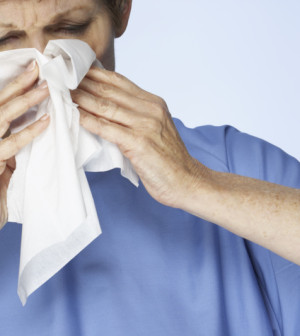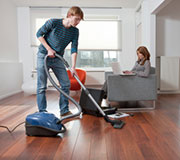- Are You Making This Expensive Thermostat Error This Winter?
- Recognizing the Signs of Hypothyroidism
- 10 Strategies to Overcome Insomnia
- Could Artificial Sweeteners Be Aging the Brain Faster?
- Techniques for Soothing Your Nervous System
- Does the Water in Your House Smell Funny? Here’s Why
- Can a Daily Dose of Apple Cider Vinegar Actually Aid Weight Loss?
- 6 Health Beverages That Can Actually Spike Your Blood Sugar
- Treatment Options for Social Anxiety Disorder
- Understanding the Connection Between Anxiety and Depression
Spring Cleaning Helps Stave Off Allergy Symptoms: Experts


For allergy sufferers, spring cleaning does more than make their home look nice — it can help prevent allergy symptoms.
“Thoroughly cleaning your home can help eliminate allergens and keep new ones from easily entering,” Dr. James Sublett, president-elect of the American College of Allergy, Asthma and Immunology (ACAAI), said in a college news release.
“Allergy season can last all year for those sensitive to indoor allergens, but it can worsen in the spring months when pollen becomes an issue. It’s important to remove allergens from the home so you can lead a healthy and active lifestyle,” said Sublett, past chair of the college’s indoor environment committee.
The ACAAI offered advice on how to remove allergens from your home and how to prevent more from getting in.
One way to reduce your spring-cleaning workload is to keep on top of things throughout the year. Change your air filters every three months and use filters with a MERV rating of 11 or 12. Vacuum regularly to get rid of dust mites, using a vacuum with a HEPA filter or a cyclonic vacuum, the ACAAI advises. Wash bedding and stuffed animals every week.
Moisture control helps reduce mold. Use bathroom fans and clean up any standing water immediately. Use detergent and water to scrub visible mold from surfaces and completely dry them. It also helps to keep your home humidity below 60 percent and clean gutters regularly, the experts noted in the news release.
If you have any pets, it’s likely that after the winter your home has elevated levels of fur, saliva and dander, they added. Reduce levels of these allergens by vacuuming often and washing upholstery, including your pet’s bed. Never let your pet in your bedroom.
You may be tempted to open your windows to allow fresh spring scents into your home, but doing so can allow pollen particles inside. You should also know that chemicals in air fresheners and candles can trigger asthma attacks, the experts warned.
Don’t go outside at midday or in the afternoon, when pollen counts are highest, the ACAAI suggests. When gardening or mowing the lawn, wear gloves and an N95 particulate pollen mask. Take your allergy medication before you go outside and don’t touch your eyes. Wash your hands, hair and clothing when you go back inside your home.
More information
The U.S. National Library of Medicine has more about seasonal allergies.
Source: HealthDay
Copyright © 2026 HealthDay. All rights reserved.










